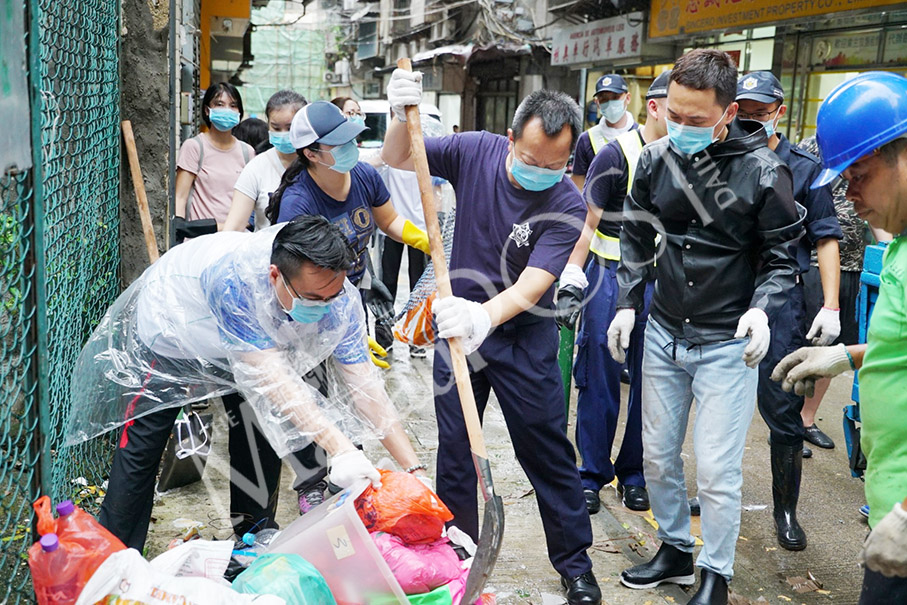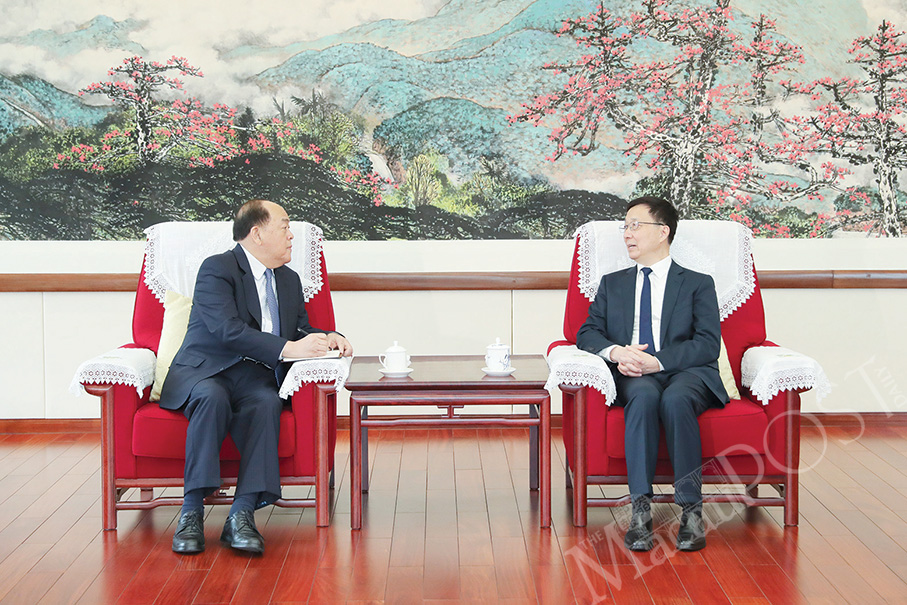Secretary for Security Wong Sio Chak said yesterday that the various tasks to respond to typhoons and other disasters that the government has prepared since last year have enabled the authorities to obtain a “relatively ideal” achievement in its tackling of Super Typhoon Mangkhut that pummelled Macau on Sunday.
Wong made the remarks during a press conference at the S. Francisco Barracks summarising the government’s tasks in preparation for Severe Typhoon Mangkhut and its disaster prevention and mitigation tasks. The press conference, which also focused on the government’s ongoing tasks to restore the typhoon-hit city to normal, was attended by Wong and a raft of senior officials under the government’s civil protection structure.
Wong said that Super Typhoon Mangkhut was a “very severe” natural catastrophe following the disaster of last year’s Super Typhoon Hato. He noted that the No. 10 signal was hoisted for nine hours – the longest time since 1968.
Wong, who chaired yesterday’s press conference, said that the comprehensive preparations the government has made for tackling typhoons combined with the joint efforts of the government and the citizenry proved effective for responding to Mangkhut.
“In the wake of last year’s Hato, various entities of the Macau Special Administrative Region Government fully reviewed and assessed their disaster prevention mechanism. After improving the system and making comprehensive preparations over the past year, the government has made significant improvements in typhoon forecasting, the issuing of typhoon warning signals, civil protection emergency response mechanism, coordination between different government entities, crisis response, awareness and ability to tackle typhoons and information dissemination,” Wong said.
“Before the typhoon [Mangkhut] hit Macau, various [public security forces] entities had carried out a large number of civil protection and evacuation exercises, briefing sessions and education campaigns [concerning the government’s evacuation plan for storm surges],” Wong said.
‘Relatively ideal’
Wong said that the government had obtained a “relatively ideal” achievement in its tasks in responding to Super Typhoon Mangkhut due to six major reasons, apart from Chief Executive Fernando Chui Sai On paying close attention to the matter and the length of time he stayed at the Civil Protection Operations Centre – located at the Immigration Department Building in Pac On in Taipa – where he personally directed typhoon response tasks, and the preparatory tasks that various government entities carried out over the past year.
6 major reasons
Wong said the first reason was that residents’ civil protection awareness has hugely increased, adding that residents made proper preparations in advance before Typhoon Mangkhut hit the city. He said that most of the residents living on low-level floors in flood-hit neighbourhoods followed evacuation instructions by law enforcement staff members. He said that consequently there were no fatalities during Mangkhut’s onslaught, adding that the number of injuries enormously decreased compared to those caused by Hato and that financial losses due to Mangkhut were minimal.
Typhoon Hato in August last year killed 10 people, injured 244 and caused overall damage estimated by the government at 12.5 billion patacas.
Evacuations
For the first time, the government evacuated residents living in low-lying areas during a typhoon before severe flooding caused by a storm surge hit their neighbourhoods. The new evacuation plan formulated earlier this year was launched when the fourth level of
a storm surge warning signal (also called the red warning) was issued at 9 p.m. on Saturday. The red storm surge warning is issued when the flood level is forecast to reach between 1.50 metres and 2.50 metres above the street level in the Inner Harbour area.
It was the first time that the government carried out a massive – voluntary – evacuation of residents in the city’s low-lying areas during a typhoon. According to official statistics, 5,650 people were evacuated.
Wong said that the second reason was that the government had asked the city’s six gaming operators to provide residents with a large number of free parking spaces in their properties, adding that the government had provided a considerable number of free parking spaces in its own buildings before the typhoon hit the city. He said that the situation had kept potential damage to cars caused by flooding to the minimum.
According to official figures, the gaming operators provided 2,770 free parking spaces during the typhoon.
Thirdly, Wong said that the government had asked the gaming operators to suspend gaming operations before the typhoon hit the city after assessing safety risks to residents and tourists alike.
It was the first time ever that the government requested the city’s gaming operators suspend all their casino operations to minimise typhoon-related safety risks. All the city’s casinos suspended gaming operations at 11 p.m. on Saturday until resuming business at 8 a.m. yesterday.
The Meteorological and Geophysical Bureau (SMG) hoisted the No. 1 signal for Mangkhut at 11 a.m. on Saturday and the No. 3 signal at 6 p.m., before raising the signal to No. 8 at 2 a.m. on Sunday. The weather station hoisted the No. 9 signal at 9 a.m. on Sunday and finally raised the signal to No. 10 – the highest warning signal – at 11 a.m. After Mangkhut descended on Macau, the signal was finally lowered to No. 8 at 8 p.m. and to No. 3 at 4 a.m. yesterday, before all typhoon warning signals were removed at 6 p.m. yesterday.
The city’s various low-lying areas were hit by serious flooding on Sunday afternoon before the floods subsided on Sunday night.
The weather bureau removed all storm surge warning signals at 11 p.m. on Sunday.
A total of 15 public car parks in the city’s low-lying areas were closed after the issuing of the red storm surge warning.
Fourthly, Wong said that the city’s border checkpoints with the neighbouring city of Zhuhai were closed during the typhoon to ensure the safety of residents and tourists alike, after the local government had liaised with its Zhuhai counterpart over the issue.
The city’s three border checkpoints with Zhuhai – the Barrier Gate checkpoint, the Zhuhai Macau Cross-border Industrial Zone checkpoint in Ilha Verde and the Lotus Flower Bridge checkpoint in Cotai – were closed at 1 a.m. on Sunday. The former two reopened at 8 a.m. yesterday. The Lotus Flower Bridge checkpoint has not reopened as it needs repairs due to damage caused by Mangkhut.
The fifth major reason Wong mentioned was that the government had decided in advance to suspend classes in the city’s schools and grant civil servants not involved in civil protection tasks a day off yesterday.
The government announced on Sunday that the city’s schools were to suspend their classes yesterday, in view of the huge impact caused by Mangkhut. The government announced yesterday that classes would resume today, except for several schools that need to carry out emergency repairs.
Wong said the sixth major reason was that most residents chose not to believe rumours about the typhoon that circulated on the Internet, adding that they chose to believe the information released by the government. He said the situation ensured that civil society remained emotionally stable which – he underlined – was beneficial to the government’s typhoon-response tasks.
The government said last night that the typhoon had caused 40 injuries – 28 men and 12 women. The government also said that 573 incidents and accidents of a various nature were recorded during Mangkhut’s onslaught. No serious injuries were reported.
Secretary for Security Wong Sio Chak speaks during yesterday’s press conference about the government’s disaster prevention and mitigation tasks tackling Super Typhoon Mangkhut, at the S. Francisco Barracks. Photo: Tony Wong

Volunteers and public security forces officers yesterday remove rubbish in the Inner Harbour area resulting from severe flooding caused by a storm surge during Sunday’s Mangkhut onslaught. Photo: GCS
PLEASE READ THE FULL ARTICLE IN OUR PRINT EDITION.








